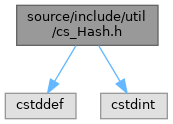#include <cstddef>#include <cstdint>
Go to the source code of this file.
Functions | |
| uint32_t | Fletcher (const uint8_t *const data, const size_t len, uint32_t previousFletcherHash=0) |
| Computes a Fletcher32 hash for the given data, interpreting it as a stream of little endian uint16_t. More... | |
| uint16_t | Djb2 (const uint8_t *data, const uint16_t size) |
| Calculates a djb2 hash of given data. More... | |
Function Documentation
◆ Djb2()
|
inline |
Calculates a djb2 hash of given data.
See http://www.cse.yorku.ca/~oz/hash.html for implementation details
- Parameters
-
[in] Pointer to the data. [in] Size of the data.
- Return values
-
The hash.
◆ Fletcher()
| uint32_t Fletcher | ( | const uint8_t *const | data, |
| const size_t | len, | ||
| uint32_t | previousFletcherHash = 0 |
||
| ) |
Computes a Fletcher32 hash for the given data, interpreting it as a stream of little endian uint16_t.
Note: previousFletcherHash = 0 indicates a fresh new hash
Note: data will be padded with 0x00 if len%2 != 0, so if an array uint8_t dat[]; has last byte equal to 0x00 and len is positive, even then: Fletcher(dat,sizeof(dat)) == Fletcher(dat, sizeof(dat)-1)
As the Fletcher32 hash is effectively a uint16_t sized block stream hash, the computation of a hash of large amounts of data can be split. *
Warning: this only holds as long as the lengths of intermediate data chunks are a multiple of 2, each call to Fletcher(...) will round the len parameter up to a multiple of 2 and padd the data with 0x00 if achieve that.
E.g.
uint8_t part0[] = { data }; size_t len0; // must be 0 % 2 uint8_t part1[] = { data }; size_t len1; // must be 0 % 2 uint8_t part2[] = { data }; size_t len2; // may be 1 % 2
uint32_t fletch; fletch = Fletcher(part0,len0); fletch = Fletcher(part1,len1,fletch); fletch = Fletcher(part2,len2,fletch);